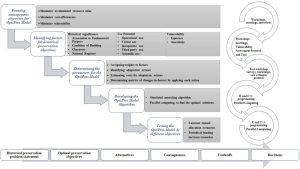Integrating Multiple Factors, Complex Tradeoffs to Evaluate Adaptation of Historic Structures

An article by a SE CASC research team including Erin Seekamp (SE CASC co-PI) and Xiao Xiao (SE CASC Researcher) along with Arizona State University student Peizhe Li, “Climate adaptation planning for cultural heritages in coastal tourism destinations: A multi-objective optimization approach,” was published in the February 2022 issue of the journal Tourism Management, available online on July 2, 2021. The article summarizes work supported by SE CASC project, Protecting Cultural Resources in the Face of Climate Change. Following is the article abstract.

Substantial climate change impacts threaten the persistence of cultural resources globally. The need exists for conceptualizing decision support tools that focus on quantifying and optimizing the managerial priorities to leverage historic preservation and adaptation actions that enhance the continuity of heritage values and sites. Informed by the Structured Decision Making (SDM) approach, this study advances the singular objective Optimal Preservation (OptiPres) Model, a decision support tool for climate adaptation planning of historic buildings by considering three tourism management objectives: (a) maximize accumulated resource value, (b) maximize cost-efficiency, and (c) minimize vulnerability. These objectives are tested under different budget scenarios using a 30-year planning horizon with a subset of buildings located in two historic districts of Cape Lookout National Seashore (CALO), United States. The multi-objective approach demonstrates the OptiPres Model is transformative, transparent, and transferable for providing cultural resource decision support and enhancing the sustainability of cultural heritage globally.
Peizhe Li, Xiao Xiao, Erin Seekamp, Climate adaptation planning for cultural heritages in coastal tourism destinations: A multi-objective optimization approach, Tourism Management, Volume 88, 2022, 104380,ISSN 0261-5177, https://doi.org/10.1016/j.tourman.2021.104380.
- Categories: